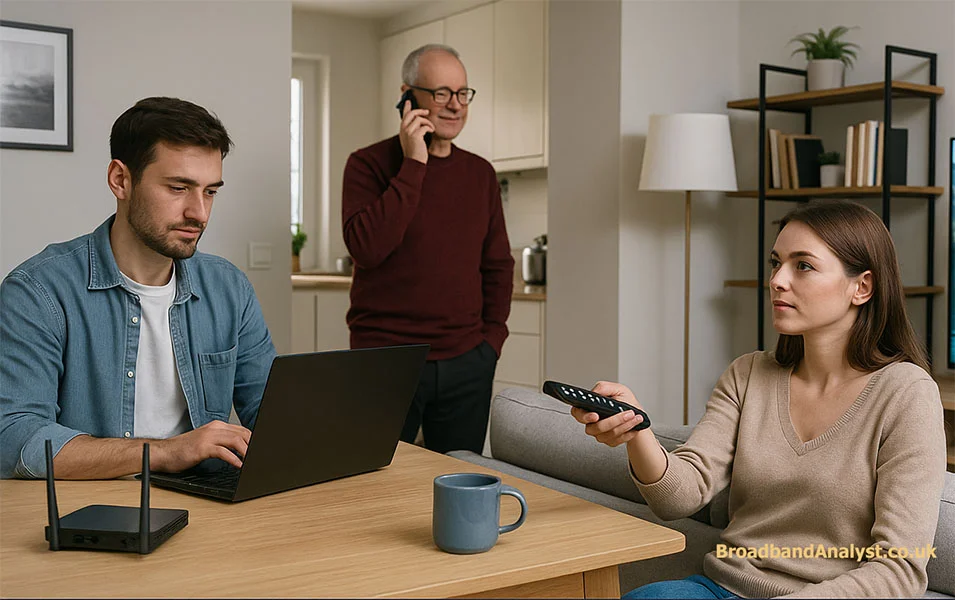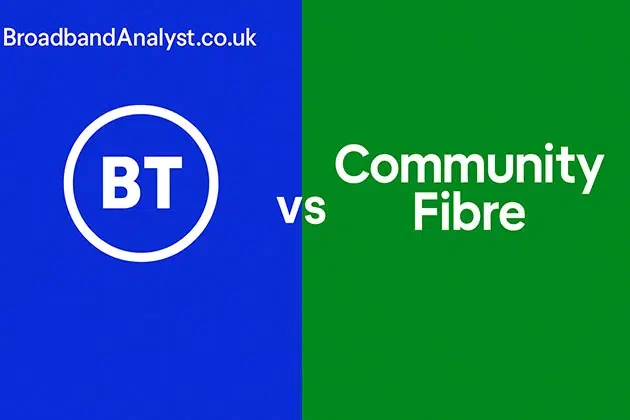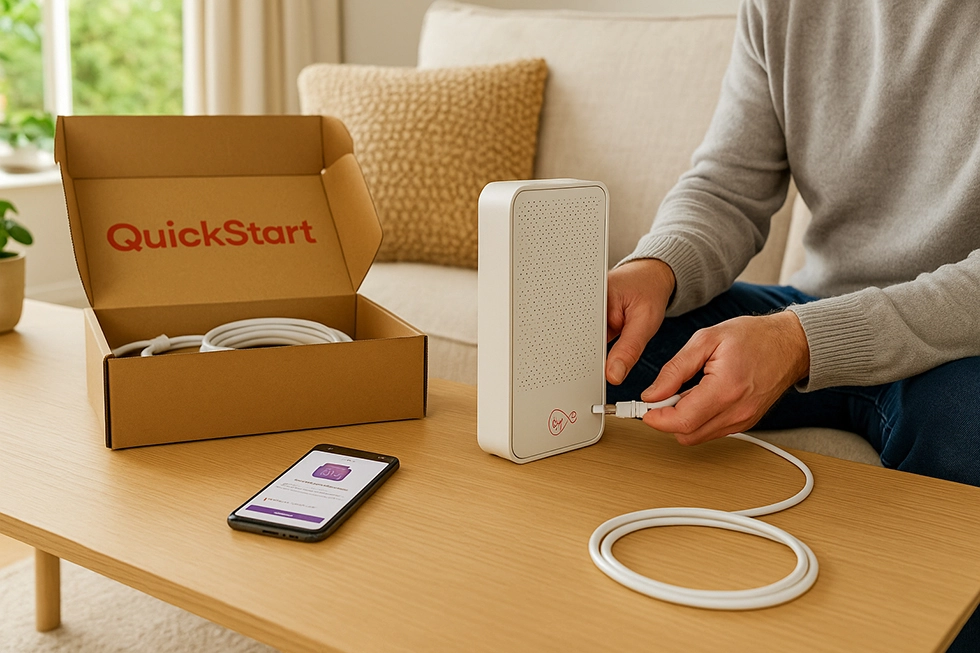BT vs Community Fibre: Who Has the Best Broadband Deals?
If you live in London, Community Fibre is one of the best value broadband providers around.
It delivers full fibre direct to your home with symmetric uploads, meaning your upload speed is the same as your download.
That’s rare in the UK, and it makes a big difference if you work from home, upload large files or rely on cloud storage.

If you live outside London, Community Fibre isn’t available. BT remains the safer option thanks to nationwide coverage on the Openreach network. You can choose from slower fibre-to-the-cabinet (FTTC) services or faster fibre-to-the-premises (FTTP), and BT also lets you bundle broadband with TV.
This comparison goes through availability, speeds, contracts, price rises, routers, Wi-Fi, customer service, extras and overall value. The aim is simple: to see which provider offers the better deal for you.
Speeds and uploads
BT
BT offers a broad range of packages. On FTTC, the maximum average download speed is around 67Mbps, with uploads at 18Mbps. These are the “up to” style legacy services, and speeds vary depending on your line length.
On FTTP, BT offers faster packages:
- Full Fibre 150 — average speeds of 150/30Mbps.
- Full Fibre 300 — average speeds of 300/49Mbps.
- Full Fibre 500 — average speeds of 500/73Mbps.
- Full Fibre 900 — average speeds of 910/110Mbps.
Downloads are fast, but uploads are always lower. That’s because Openreach configures FTTP with asymmetric speeds.
Community Fibre
Community Fibre’s big selling point is symmetric bandwidth. The speed you get down is the same as the speed you get up. Current packages include:
- 150Mbps — average speeds of 150/150Mbps.
- 300Mbps — average speeds of 300/300Mbps.
- 920Mbps — average speeds of 920/920Mbps.
- 3Gbps and 5Gbps — in selected London areas with the newest kit.
For people who upload video, run a home office, share big files or just want future-proof internet, symmetric FTTP feels much more modern.
Why uploads matter
Most UK providers only talk about downloads, but uploads have a direct impact on how quick your video calls feel, how fast cloud backups run, and how long you wait to upload big projects. Community Fibre’s symmetric uploads make daily use smoother for a typical home with multiple devices.
Pricing
Community Fibre is almost always cheaper than BT on like-for-like speeds. A 920Mbps plan in London costs roughly half the price of BT Full Fibre 900. Even with the annual increases, Community Fibre’s total over 24 months is lower.
BT
BT now shows a fixed increase that applies on 31 March each year. For broadband, it’s £4 per month on new contracts, and for TV, £2. Contracts are usually 24 months. After the minimum contract, the price jumps to a higher out-of-contract rate unless you re-contract. Out-of-contract prices can be £10–£15 more per month.
Setup fees: many FTTP deals include free activation, but check the small print for delivery or admin fees.
Community Fibre
Community Fibre keeps it simple. There’s no setup fee for standard home broadband. If you joined or re-contracted from November 2024, your monthly price goes up by £2 each April. If you roll past your minimum contract, the price increases by £4 compared to your last in-contract month, then continues to rise by £2 each April.
Contracts are also 24 months, with shorter rolling options available at a higher monthly price.
Router
BT
BT supplies the Smart Hub 2 router as standard. It supports dual-band Wi-Fi 5, and most homes will get consistent wireless performance. With Full Fibre, you connect the hub directly to the fibre ONT. If you want whole-home coverage, BT sells add-on discs to extend Wi-Fi.
Community Fibre
Community Fibre installs a Linksys Wi-Fi 6 router with all packages. Multi-gig services include premium mesh systems for better whole-home coverage. Wi-Fi 6 supports higher device density and faster local speeds, so if you have new phones, laptops or consoles, you’ll see smoother connections.
Installation
BT sometimes uses self-install kits for FTTC and FTTP, but an engineer visit may be needed if there’s no existing fibre connection. Community Fibre sends an engineer to run the fibre into your property, usually included free.
Availability and network
BT
BT uses the Openreach network. That means its services are available almost everywhere in the UK, covering rural areas with FTTC and increasingly large towns and cities with FTTP. If your postcode has FTTP, you can order faster packages ranging from 100Mbps to 900Mbps. If only FTTC is live, you’ll see lower tiers like Fibre 1 and Fibre 2, which use copper for the final stretch.
The key point: BT is universal. If broadband is available at your address, BT can connect you, even if only on slower copper-based products.
Community Fibre
Community Fibre is different. It owns and operates its own fibre network across London. Every connection is fibre all the way to your home (FTTP). Coverage now stretches across most boroughs, with new postcodes being added every quarter, but you won’t find it outside the capital.
When you check availability, Community Fibre shows which speeds are live at your building. In blocks of flats or rented properties, landlords may need to approve installation, but once the network is in, setup is straightforward.
If you’re in London, you may have a real choice: BT Full Fibre on Openreach or Community Fibre’s own FTTP. If you’re outside London, Community Fibre simply isn’t an option, and BT competes instead with Virgin Media and other alt-nets.
Extras and bundles
BT
BT’s biggest extra is TV. Through EE, you can add bundles that include NOW Entertainment, Netflix, and TNT Sports. That makes it attractive if you want broadband and TV together on one bill.
Community Fibre
Community Fibre has a TV add-on too, but it’s less central to the offer. For £10 a month you get a box with 240+ live channels plus on-demand. But most customers pick Community Fibre for broadband value, not TV.
Customer Satisfaction
BT
BT has millions of customers, which means service levels vary. On Ofcom’s complaints tracker, BT sits around the industry average for broadband.
Some customers complain about call wait times, but BT’s scale means support is available through many channels, including phone, app and community forums.
Community Fibre
Community Fibre is much smaller but has a strong reputation. On Trustpilot it carries an “Excellent” rating, and reviews consistently mention responsive engineers and quick problem resolution. As a London-focused provider, feedback is positive on both speed and support.
Which should you pick?
Pick Community Fibre if:
- You live in London and coverage is available.
- You want symmetric uploads.
- You want lower monthly costs and free installation.
- You’re happy with a smaller provider focused only on broadband.
Pick BT if:
- You live outside London.
- You want TV and broadband together.
- You prefer a large provider with nationwide presence.
- You want the reassurance of Openreach’s network for support and fault resolution.
Key checks before you order
- Compare minimum contract, in-contract rises, and out-of-contract prices.
- Look at total cost over 24 months, not just the first month’s deal.
- Consider whether symmetric uploads matter to you.
- Factor in whether you want TV as part of your bundle.
FAQs
Is Community Fibre cheaper than BT?
Yes. For like-for-like full fibre, Community Fibre’s pricing is lower. A 920Mbps plan is often half the cost of BT’s Full Fibre 900.
Who offers symmetric uploads?
Only Community Fibre. BT’s uploads are improved on FTTP but remain lower than downloads.
How do mid-contract price rises work?
BT increases broadband by £4 and TV by £2 each March. Community Fibre increases by £2 each April for new customers. Both comply with Ofcom’s new rule requiring clear pound-and-pence amounts.
Is Community Fibre only in London?
Yes. Coverage is expanding, but it remains London-only.
Can I get TV with Community Fibre?
Yes, for £10 per month in London, but it’s a simpler add-on compared with BT’s full TV bundles.

